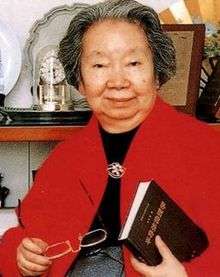Xie Xide

Xie Xide (Chinese: 謝希德; pinyin: Xiè Xīdé; 1921–2000), also known as Hsi-teh Hsieh and as Hilda Hsieh, was a Chinese physicist. She was president of Fudan University from 1983 to 1989, and remained as advisor to the university from 1989 until her death. She helped to set up the university's Centre for American Studies [1] and founded its Modern Physics Institute in 1977.
Xie also served as a member in the Central Committee of the Communist Party of China from 1982 to 1992.[2]
Biography
Xie Xide was born March 19, 1921 in the port city of Quanzhou in Fujian, southeastern China.[3][4] She was born into a family that valued education. Her father Xie Yuming had a Ph.D. from University of Chicago and taught at Yenching University in Beijing.
She spent part of her childhood in Beijing. In 1942, she began her studies in physics and mathematics at Xiamen University, and graduated in 1946. She taught at University of Shanghai for a year, and then was able to get a scholarship to study for a master's degree in physics at Smith College in the United States,[3] graduating in 1949. [5] She continued her studies at Massachusetts Institute of Technology, earning a Ph.D. in physics in 1951.[2]
From 1951 to 1952 she worked on the research staff at MIT.[2] She then returned to China and became a lecturer in the Department of Physics at Fudan University in Shanghai, one of China's top universities. She served in this position from 1952 to 1956.[4] She became an associate professor at Fudan and served in that capacity from 1956 to 1962. From 1958 to 1966 she served as adjunct director, Shanghai Institute of Technical Physics, Chinese Academy of Sciences. In 1962 she was appointed Professor of Physics, Fudan University and continued in that capacity. From 1978 to 1983 she served as Director of the Institute of Modern Physics of Fudan University. She was appointed vice president of Fudan in 1978, and President in 1983, serving in that capacity until 1988. She was the first woman president of a major comprehensive university in the PRC.[3] From 1985 she also served as Director of the Center for American Studies of Fudan University, and in 1988 she was appointed Advisor to Fudan University.[2]
Xie Xide was an outstanding educational leader, and also a key figure in the development of China's educational relations with the international community.[3]
Xie Xide pursued a distinguished career as a scientist, making important contributions in the field of solid-state physics.[3] Her research work was concentrated in solid state physics, semiconductor physics, and surface physics.[6]
Xie Xide was appointed to the Communist Party's Central Committee in 1982 and served as one of 210 full members.[2][7]
Following their completion of graduate studies, she married Cao Tianqin (Tien-chin Tsao), a long-time friend who became a distinguished biochemist; their son was born in 1956.[3][7]
Xie Xide died on March 4, 2000.[4]
Published works
Xie Xide published more than eighty papers and several books and monographs.[4] Some of Xie's published work include:
- "Resonant Cavity Study of Semiconductors," Journal of Applied Physics 25: 302 (1954), with J.M. Goldey and S.C. Brown.
- "Electronic Properties of Metals Chemisorbed on Semiconductor Surface and Metal/Semiconductor Interfaces," Progress in Surface Science 28: 71 (1988).
- "Overview of Metal/Semiconductor Interfaces," The Structure of Surfaces. Springer Series in Surface Sciences 24. Berlin: Springer, 1991, p. 576.
- "Recent Developments in Some Metal/Semiconductor and Superlattice Interfaces," Materials Chemistry and Physics 38: 1 (1994).
- "Vibrational Properties of Si/Ge Superlattices," Progress in Surface Sciences 54:69-113 (1997), with Zhang Kaiming and Zi Jian.
- "Ab initio calculation of the structure of the random alloys SnxGe1-x" Phys. Rev. B 56: 12084 (1997), with Jianhua Shen, Jian Zi, and Ping Jiang.
Xie also published the following books:
- Semiconductor Physics. Science Publisher, 1958, with K. Huang.
- Group Theory and Its Applications. China: Science Publisher, 1986.[2]
Honors
Since 1981, Xie Xide has received honorary doctorates from twelve universities from a number of different nations and regions, including the United States, United Kingdom, Japan, Canada, Hong Kong and China.[4] Xie Xide was a Fellow of the American Physical Society, an Academician of the Third World Academy of Sciences, and a Distinguished Scholar of the Committee on Scholarly Communication with The People's Republic of China.[4]
References
- ↑ "Centre for American Studies, Fudan University". Archived from the original on 2007-03-19. Retrieved 2007-03-20.
- 1 2 3 4 5 6 "Xie, Xide". CWP at physics.ucla.edu. Retrieved 2007-03-20.
- 1 2 3 4 5 6 Ruth Hayhoe (2006). Portraits of Influential Chinese Educators. Springer. p. 172. ISBN 9789628093403.
- 1 2 3 4 5 6 "A Brief Introduction to Xie Xide". Fudan University.
- ↑ "Notable Alumnae". smith.edu. Retrieved 2008-12-15.
- ↑ "Xie Xide" A talented female physicist" Check
|url=value (help). Xiamen University. 2012. - 1 2 Takashi Oka (1984). "Xie Xide - The gentle president of China's Fudan University". The Christian Science Monitor.
| Political offices | ||
|---|---|---|
| Preceded by Li Guohao |
Chairman of Shanghai CPPCC 1988–1993 |
Succeeded by Chen Tiedi |